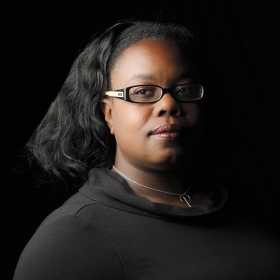TJ Jarrett ’95
TJ Jarrett ’95 has never followed the typical path for a poet. When she entered Wellesley in 1991, she planned to become a lawyer rather than pursue an academic career. After college, she got a job as a bookkeeper with a medical transportation company.

TJ Jarrett ’95 has never followed the typical path for a poet. When she entered Wellesley in 1991, she planned to become a lawyer rather than pursue an academic career. After college, she got a job as a bookkeeper with a medical transportation company. That opportunity led, over time, to a career in data analysis.
Jarrett’s unusual choices—and her growing reputation as a writer—caught the attention of The Atlantic Monthly, which featured an email interview with her last summer titled “Computer Engineering: A Fine Day Job for a Poet.” In the exchange, Jarrett described her work as a senior integration engineer at HealthTrust in Nashville as moving “data from place to place” to analyze how facilities purchase medical/surgical equipment and how they can save money. At night, she works on poems in the Red Door Saloon, her local watering hole in Nashville.
How does writing computer code compare with writing lines of verse? Jarrett told The Atlantic that she tends “to break things up into functions.” “If a poem is a tiny machine, then a volume of poetry is a car or a plane—a bunch of parts that come together to perform a larger action.”
In her second book, Zion, winner of the 2013 Crab Orchard Open Competition, one of the actions performed is a reclamation of voices that were silenced during the Jim Crow era. Jarrett speaks for men and women who suffered under the laws, including some of her own family members. She also creates a sustained dialogue with Theodore Bilbo, the reviled governor of Mississippi who championed the oppressive statues.
Yet instead of portraying Bilbo as a pure villain, Jarrett gives him a measure of humanity, creating the possibility for empathy, if not reconciliation. “If you can’t deal with other people’s humanity, how can you expect them to deal with yours?” she says. “I do myself and my readers a disservice by staying angry.”
Jarrett believes in redemption and the importance of seeing through other people’s eyes. “We are given a chance to really survive and thrive in the world,” she says. “Is arguing all the time the best we can do?”
That perspective was shaped by her father and mother, a pastor and an English professor, respectively, who understood the power of language. Every summer, mother and daughter stayed with Jarrett’s maternal grandparents in Meridian, Miss., the state’s second largest city. Prejudice affected nearly every aspect of life there. “It’s a very sad place,” the poet recalls. “A place I love and wanted so desperately to love me back.”
Jarrett’s mother also introduced her to Paula Rankin, a coworker and celebrated poet who critiqued the teenager’s writing and assigned a rigorous reading list.
Jarrett stopped writing between the ages of 20 and 33 because “I had nothing to talk about,” she says. After a bad breakup, she began writing again, and several months later, a new love encouraged her to apply to the Bread Loaf Writers’ Conference. She was accepted. A year later, she enrolled in Bennington College’s Writers Seminars, where she studied with some of the nation’s best poets. In 2013, she published her first book, Ain’t No Grave, a fierce collection about America’s racist past. “The subject picked me,” she explains.
That seems to be the case with every poem since, as if an invisible force is pushing Jarrett to write about difficult topics in a way that resonates with diverse readers and creates a bridge toward understanding. “I’m not sure how it works, but I am called to write these poems,” she says. “I end up in places where I need to be without working.”